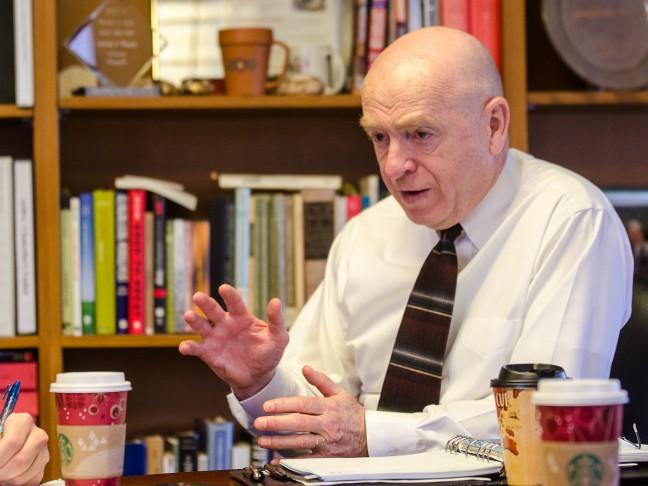Criticisms alluded to the University of Wisconsin-Madison Chancellor Rebecca Blank at the state’s Joint Finance Committee hearing Tuesday amid discussions of the proposed budget cuts and autonomy for the UW System.
Walker’s budget proposal would cut $300 million from the UW System over the 2015-17 budget. With these cuts, Walker said he would give UW System more autonomy.
UW System President Ray Cross asked the committee to reduce the $300 million cut, saying the amount was too high.
“This proposed cut is serious, and I know from your public comments and our conversations that you agree,” Cross said.
Rep. Dean Knudson, R-Hudson, was critical of UW-Madison Chancellor Rebecca Blank and her reaction to the UW System cuts. While not mentioning her by name, he criticized a chancellor who used UW resources to talk to alumni in a “fairly political way.” Blank sent an email to UW alumni in February encouraging them to oppose the cuts.
“Some chancellors have been extremely specific in saying that for our campus it will mean a 15 percent cut, and here’s what this will mean, and they’ve already started making changes in how many course positions and course offerings there are, before we’ve even completed the conversation here,” Knudson said.
Cross said the current lack of flexibility is a burden on UW and taxpayers. He said combining the flexibilities into a single proposal will help build a more stable and sustainable system in the future.
Cross: Budget moves WI from top 4 most regulated states in higher ed to one that is more autonomous but no less accountable to the public.
— Universities of Wisconsin (@UniversitiesWI) March 3, 2015
Cross said the budget should include creating a dedicated funding stream for UW System. As a public authority, the UW System will be able to better model future revenue expectations and more precisely forecast pricing in the future with the funding stream, Cross said.
“Ultimately we will make the cost of public higher education in Wisconsin predictable and stable for families, taxpayers and, of course, you, the decision makers,” Cross said.
Democrats, however, criticized Republicans for cutting funding for universities and seeking another cut in this budget.
“What we’re dealing with is the consequences of the UW System simply not being a priority,” Rep. Gordon Hintz, D-Oshkosh, said.
Walker has proposed an additional two year tuition freeze for in-state undergraduate students.
Cross said by increasing out-of-state, professional and graduate school tuition, the UW System could raise $20-$30 million, with much of that money coming from UW-Madison.
Rep. Dale Kooyenga, R-Brookfield, asked Cross how he would keep tuition down with a public authority. Students and several lawmakers have raised concerns that tuition would spike once the system had more flexibility to raise tuition.
“What are your ideas to control the rising cost of tuition and make sure our families in Wisconsin are not going to go down the same route that nationally our students are going on, with student debt which is crushing?” Kooyenga asked.
Cross said he does not believe the UW System should raise tuition aggressively, calling it a “serious mistake” that would put flexibilities at risk.
He said tuition should be based on costs, the needs of the state and affordability. A stable funding stream will help keep tuition in line, he said, as a decline in funding for the UW System often leads to an increase in tuition.
Richard Grusin, a UW-Milwaukee professor, composed an open letter to Cross last week urging the UW System to wait until at least the next biennial budget proposal before taking action to give the UW System more autonomy. Nearly 500 faculty, alumni and students across the UW System have signed that letter.
The full Assembly and Senate will vote on the budget later this year. After the two chambers pass the budget, it goes back to Walker, who has partial veto power to strike items from the final budget.


